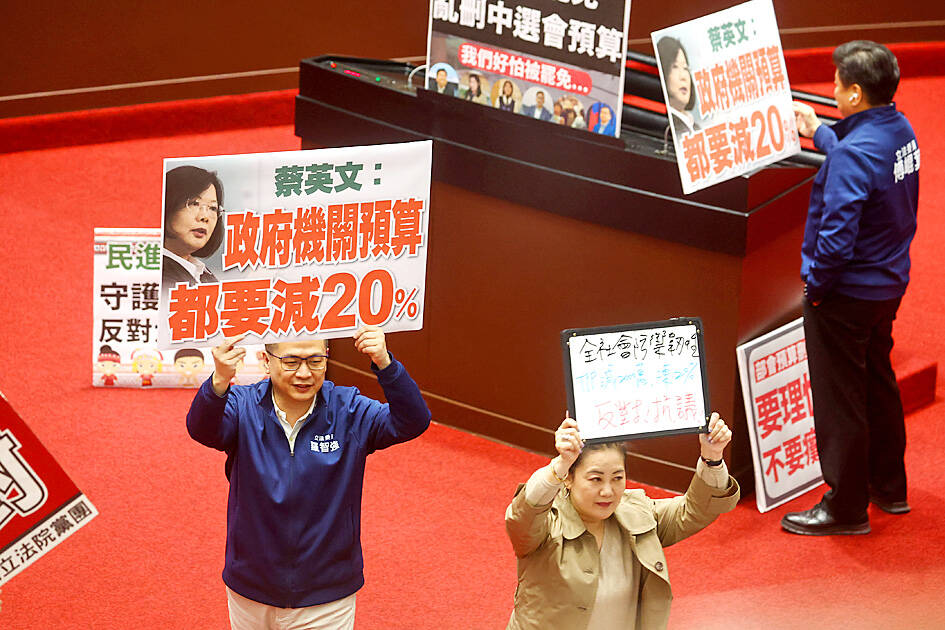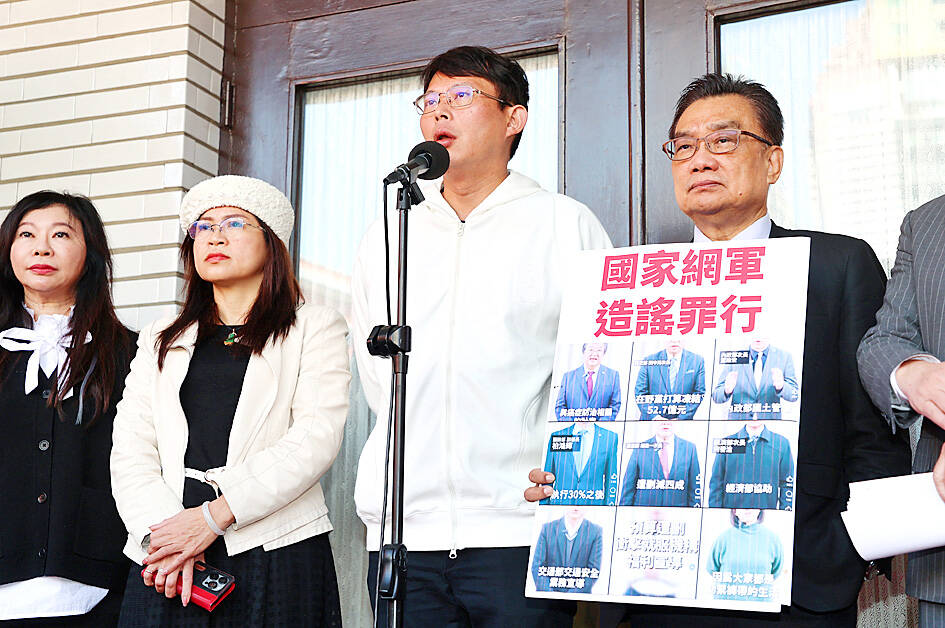Chinese Nationalist Party (KMT) caucus deputy secretary-general Lo Chih-chiang (羅智強) yesterday said his caucus would propose legislation in the next session that aims to penalize officials who lie.
Lo made the remark after Premier Cho Jung-tai (卓榮泰) denounced opposition parties for cutting and freezing the central government’s total budget.
KMT and Taiwan People’s Party (TPP) lawmakers cut NT$93.98 billion (US$2.9 billion) from the central government’s general budget on Friday.

Photo: CNA
The legislature continued its budget review yesterday and today, and was projected to cut another NT$100 billion at least.
As agencies under the Cabinet have been claiming that the budget cut would affect social welfare, the KMT caucus would propose bills to introduce an “honest government act and lying offenses for officials,” Lo said.
“The DPP should explore the example of [Tesla CEO] Elon Musk. When [US president-elect] Donald Trump proposed the Department of Government Efficiency to restructure the government, he [Musk] proposed a US$2 trillion cut in budget. Has the US been destroyed?” he said.

Photo: Tien Yu-hua, Taipei Times
In the past, former president “Tsai Ing-wen (蔡英文) said the budget cut should be 20 percent. A budget cut of 10 percent cannot make the government change; a cut of 20 percent can transform its structure,” he added.
The corruption case of Ultra Source’s (超思) egg imports squandered NT$500 million from the national treasury, while corruption in the Tainan solar energy project and Taiwan Power Co’s (Taipower) deficit cost the government at least NT$10 billion and NT$100 billion respectively, Lo said.
“The opposition parties strive to safeguard people’s wallets. How can we paralyze the government with just a 3 percent budget cut?” he said, adding that the government was spreading rumors and that officials were lying, because they would not be penalized.
“Although Constitutional justices protect the right of governmental officials to lie at the legislature, they do not ensure their right to lie about political affairs. We are exploring the possibility of proposing the legislation of the honest government act and lying offenses for officials in the next legislative session. Let the public decide whether the officials are spreading rumors and lying,” Lo said.
Separately yesterday, KMT caucus secretary-general Lin Szu-ming (林思銘) said it is lawmakers’ duty to review the budget and cut inefficient or inappropriately listed budget items.
The DPP government has long exploited budget items such as “operating expenses” and “media propaganda expenses” to fund “cyberwarriors,” wasting public funds without producing benefits, Lin said.
The KMT caucus strengthened its legislative supervision by freezing the budget, which is not equivalent to removing the budget, he said.
Agencies only have to report to the legislature on progress when a certain part of the budget has been spent, to ensure that taxpayers’ money were used to improve people’s livelihoods, instead of being used for political manipulation, Lin said.
The opposition’s budget cut proposals are not final, so ministries and departments should be more proactive in communicating and explaining their budget plans, he added.
TPP caucus whip Huang Kuo-chang (黃國昌) yesterday said the central government’s total budget for this year reached a new high of NT$3.2 trillion.
The TPP caucus reviewed the budget and proposed a total cut of slightly more than NT$100 billion and denied the NT$100 billion budget to subsidize Taipower’s deficit, he said.
With these cuts, the Cabinet still has a budget of NT$2.9 billion, but Cho chose to incite the public by circulating biased information through administrative departments and state-level cyberwarriors instead of facing and solving the problem, Huang said.
If Cho is so incompetent that he does not know how to do his job with NT$2.9 billion in his hands, he should resign as premier instead of polarizing society and causing conflicts, he said.
Additional reporting by Lin Che-yuan

Alain Robert, known as the "French Spider-Man," praised Alex Honnold as exceptionally well-prepared after the US climber completed a free solo ascent of Taipei 101 yesterday. Robert said Honnold's ascent of the 508m-tall skyscraper in just more than one-and-a-half hours without using safety ropes or equipment was a remarkable achievement. "This is my life," he said in an interview conducted in French, adding that he liked the feeling of being "on the edge of danger." The 63-year-old Frenchman climbed Taipei 101 using ropes in December 2004, taking about four hours to reach the top. On a one-to-10 scale of difficulty, Robert said Taipei 101

A preclearance service to facilitate entry for people traveling to select airports in Japan would be available from Thursday next week to Feb. 25 at Taiwan Taoyuan International Airport, Taoyuan International Airport Corp (TIAC) said on Tuesday. The service was first made available to Taiwanese travelers throughout the winter vacation of 2024 and during the Lunar New Year holiday. In addition to flights to the Japanese cities of Hakodate, Asahikawa, Akita, Sendai, Niigata, Okayama, Takamatsu, Kumamoto and Kagoshima, the service would be available to travelers to Kobe and Oita. The service can be accessed by passengers of 15 flight routes operated by

Taiwanese and US defense groups are collaborating to introduce deployable, semi-autonomous manufacturing systems for drones and components in a boost to the nation’s supply chain resilience. Taiwan’s G-Tech Optroelectronics Corp subsidiary GTOC and the US’ Aerkomm Inc on Friday announced an agreement with fellow US-based Firestorm Lab to adopt the latter’s xCell, a technology featuring 3D printers fitted in 6.1m container units. The systems enable aerial platforms and parts to be produced in high volumes from dispersed nodes capable of rapid redeployment, to minimize the risk of enemy strikes and to meet field requirements, they said. Firestorm chief technology officer Ian Muceus said

MORE FALL: An investigation into one of Xi’s key cronies, part of a broader ‘anti-corruption’ drive, indicates that he might have a deep distrust in the military, an expert said China’s latest military purge underscores systemic risks in its shift from collective leadership to sole rule under Chinese President Xi Jinping (習近平), and could disrupt its chain of command and military capabilities, a national security official said yesterday. If decisionmaking within the Chinese Communist Party has become “irrational” under one-man rule, the Taiwan Strait and the regional situation must be approached with extreme caution, given unforeseen risks, they added. The anonymous official made the remarks as China’s Central Military Commission Vice Chairman Zhang Youxia (張又俠) and Joint Staff Department Chief of Staff Liu Zhenli (劉振立) were reportedly being investigated for suspected “serious